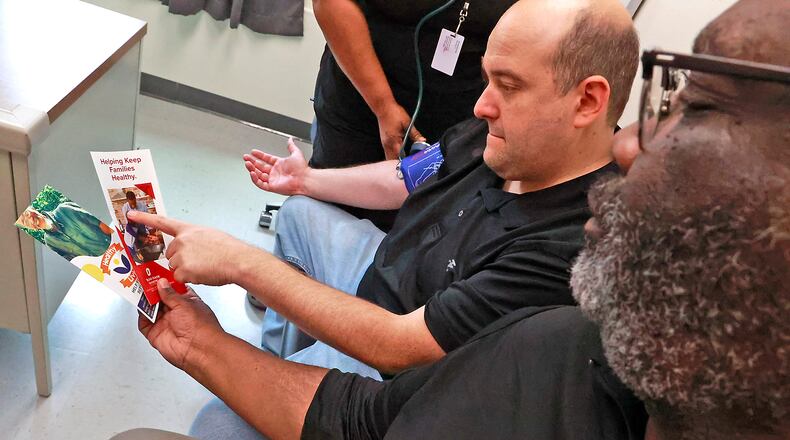“We want to promote men’s heightened awareness of their own health ... Men, we want you to be around for a long time in the lives of your children and your family, so we want to do whatever we can to get you out and get those preventative health visits and get screenings,” Cook said. “Whatever it takes to prevent those those things that are killing our men here in Clark County.”
Patterson said regular health screenings are crucial to catch small things before they become big. He said he knows this firsthand because his doctor found and removed three polyps — one of which was likely to develop into cancer — during his first colonoscopy at age 50.
“Getting that preventative screening probably saved me from having colon cancer because [they] detected it early,” Patterson said.
In the U.S., men live on average six years less than women and are more likely to suffer from certain cancers and diseases, Cook said.
Men are less likely to get regular checkups, with 63% of men in Clark County reporting they do not get health screenings. Cook said it is important to go for health screenings and checkups on a regular basis.
“Preventative maintenance just like you do with your car; you put it up on the rack you change the oil,” Cook said. “... Those regular checkups can detect small problems before they become big problems.”
Common cancers in men are prostate, testicular and colon cancer, and they are all very treatable if caught early, Patterson said.
“As inconvenient and as uncomfortable as those exams may be from front to back, it’s far better than a colostomy bag, it’s far better than losing items, it’s far better than surgical removal of your prostate or implantation of a radiation seed or something like that,” Patterson said.
Men are also more likely than women to get lung cancer, heart disease and stroke in part because they smoke at a higher rate, Patterson said. He said there is a wealth of resources to break the habit including nicotine patches and gum, and the quit helpline at 1-800-QUIT-NOW.
Lungs can regain most of their function and become healthy again after a person quits smoking, and most health insurance companies cover CT scans to check for lunch cancer and nodules, which are treatable if caught early, Patterson said.
Secondhand smoking affects children’s lungs and can inhibit their ability to function healthily, play sports and take part in other physical activities, Cook said.
“Men, you’ve got a responsibility to bring your family up in a healthy household too,” Cook said.
The No. 1 killer of men in the U.S. is heart disease, Cook said, and one way to reduce the chances of developing it is by eating healthy foods. At least half of a person’s plate should be made up of fruits and vegetables.
Another way to prevent disease and live a longer, healthier life is by exercising at least 30 minutes per day, Patterson said.
“Not everybody has a job where this is possible, but on your lunch time if you can go for a brisk 15-minute walk, if you’ve got a minute between meetings — walking outside,” Cook said.
In Clark County, men are almost five times more likely to die by suicide than women, with men being hesitant to ask for help and take advantage of mental health resources, Patterson said. The mental health helpline at 988 is available 24/7.
“You don’t have to tough it out; you need to talk to somebody,” Patterson said.
Hispanic men are less likely than other men to ask for help with their mental health due to a cultural taboo, Cook said, and the death rate by suicide in Latino men is increasing.
Patterson said men can also increase the likelihood of living a long and healthy life by staying up-to-date on their vaccines. This includes the COVID-19 shot, measles, flu, chicken pox and more.
About the Author
